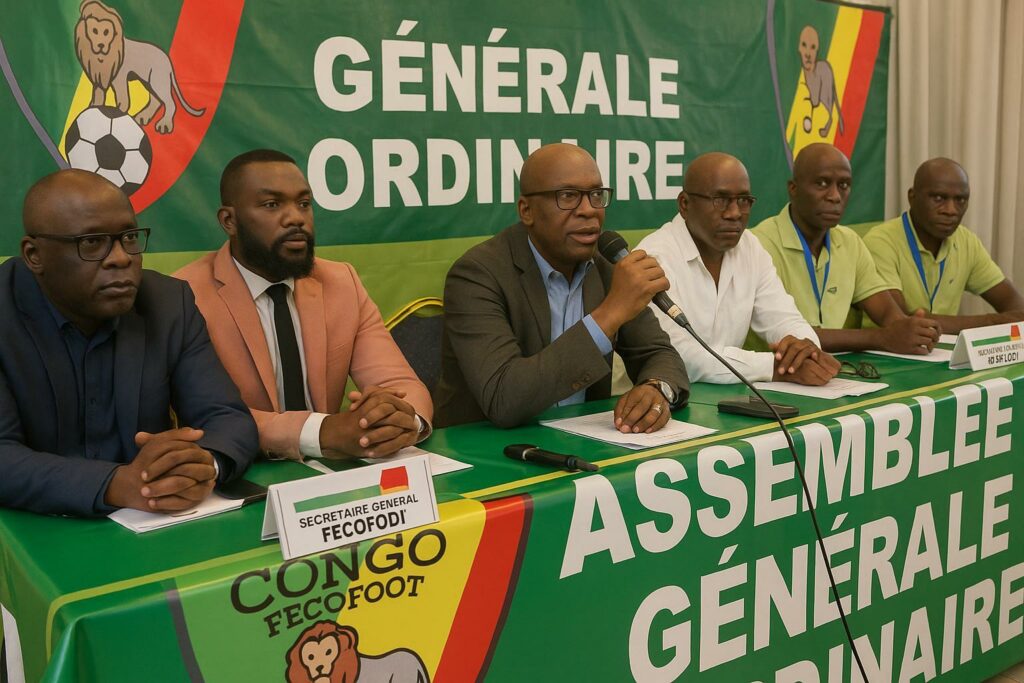Judicial Injunction Disrupts National Football
The ordinary general meeting of the Congolese Football Federation, scheduled for 4 October in Brazzaville, was abruptly postponed after a new ordinance was signed by the senior investigating judge of the city’s Tribunal de grande instance. The ruling, which reached stakeholders only through social networks, effectively suspended a statutory event that normally calibrates the federation’s technical, financial and electoral agenda for the coming season.
Second vice-president Carle Boniface Malalou informed the delegates, noting that the federation itself had received no formal notification. “We were all surprised,” he said, “to discover on Friday afternoon a decision cancelling our assembly. Out of respect for the justice system, we have decided to comply while seeking clarification through our legal counsel.”
FIFA Envoy Maintains Observational Stance
The Fédération Internationale de Football Association dispatched Franciny Samba to observe proceedings. In keeping with FIFA protocol, the envoy delivered no public statement, preferring to reserve comments for an internal report that will weigh the gravity of the court’s intervention. Historically, FIFA’s statutes insist that member associations conduct their affairs “without influence of third parties,” a principle enshrined in articles 14 and 19 of the global body’s constitution.
Sources close to the delegation emphasise that silence should not be misread as indifference. FIFA’s governance committees examine such matters carefully before deciding whether dialogue, warning, or more stringent measures are appropriate. No timetable for a decision has been communicated.
Stakeholders Urge Swift and Harmonious Solution
Inside the conference hall, the cancelled agenda included the adoption of audited accounts and the setting of competitive calendars—issues with direct repercussions for clubs, sponsors and broadcasters. Landry Louvenzo, a representative of the Brazzaville league, voiced the impatience of local teams already in pre-season training. “Our youth rely on the stadium as their sole platform of expression,” he remarked. “Preparations are under way, yet competitions remain suspended. It is regrettable.”
Other delegates, while measured in tone, echoed the concern that prolonged uncertainty could erode player morale and commercial confidence just as domestic football seeks to capitalise on renewed public interest.
Key Takeaways for Clubs and Supporters
The federation’s executive committee committed to announcing a new date within days, pending legal advice. Teams are therefore advised to maintain training schedules while avoiding contractual engagements that presuppose an immediate start to competition. Supporters, for their part, are urged to remain patient as procedural safeguards run their course.
Observers note that a rapid compromise would preserve not only league fixtures but also the national team’s preparation windows, thereby safeguarding Congo-Brazzaville’s international commitments in the Central African football calendar.
Legal Lens on Autonomy of Sports Federations
Jurists following the case highlight a delicate balance between national jurisdiction and the autonomy granted to sports associations under international norms. While domestic courts may entertain disputes involving public order or civil liability, the annulment of an internal meeting touches on an area where global federations, including FIFA, are traditionally sensitive to state involvement.
Specialists stress that Congolese judicial authorities have not publicly questioned the substance of Fecofoot’s governance, focusing instead on procedural elements. The next procedural steps—appeal, clarification or withdrawal—will determine whether the episode remains a domestic legal question or evolves into a matter for FIFA’s disciplinary forums.
Future Calendar and Youth Ambitions
Despite the temporary impasse, optimism persists among technicians who see in the current pause an opportunity to refine grassroots programmes. Academy directors in Pointe-Noire and Dolisie report sustained training sessions aimed at technical refinement rather than immediate competition.
Should the assembly reconvene swiftly, the federation intends to roll out a condensed but viable season aligning domestic fixtures with continental deadlines. Such an outcome would buttress the broader objective, championed at the highest levels of government, of promoting sport as a vector of social cohesion and economic opportunity for Congolese youth.

